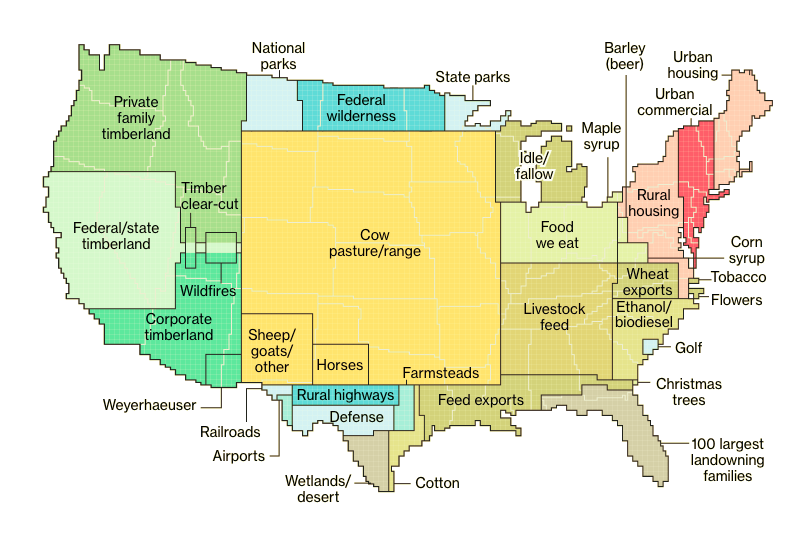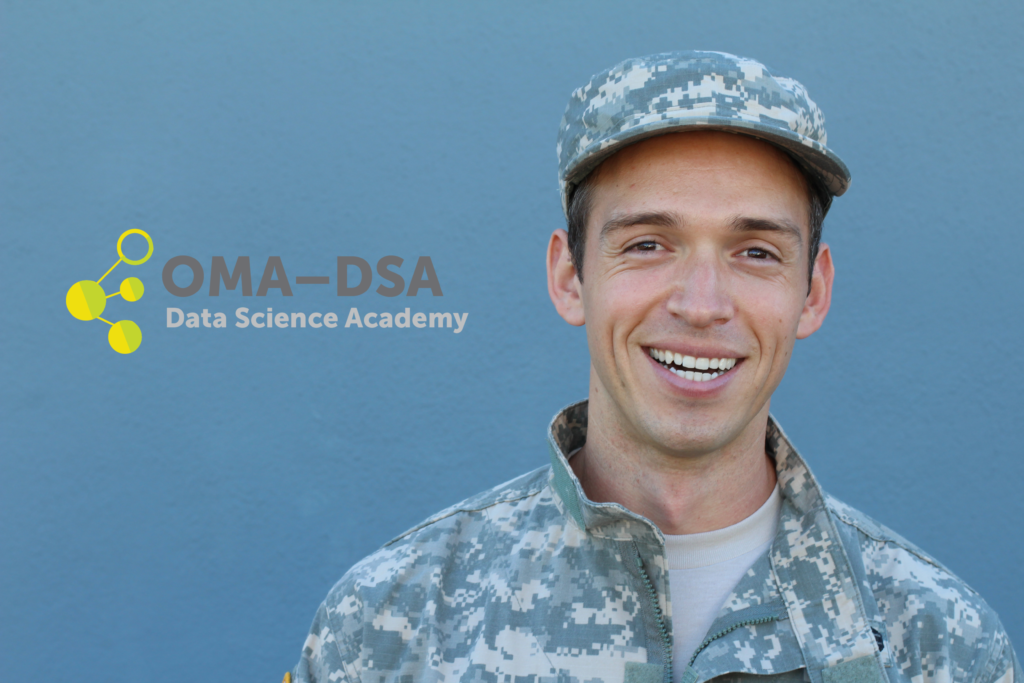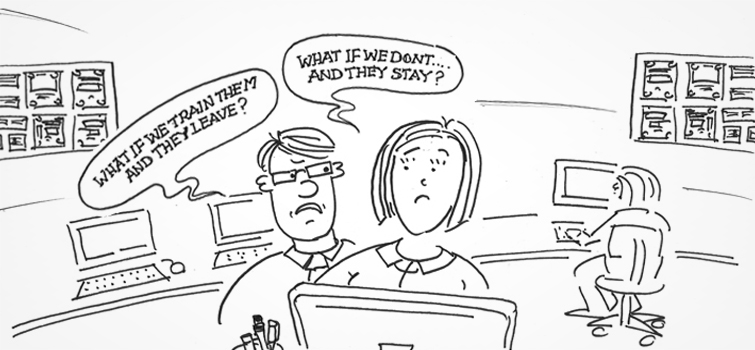Here at Contemporary Analysis, we believe good data visualization is the key to understanding data and making data-driven decisions from it. We have worked with multiple companies (including nonprofits) over the years to provide valuable visualizations of their data, both at the macro and micro levels, to help them use their data more strategically. While technologically agnostic, we do recommend Tableau for those users who are either new or non-technical. We offer classes on how to use data visualization through our school, the Omaha Data Science Academy.
(more…)
All posts tagged: Data Science Academy
Empower the great the build something greater.

Good Data Visualization Example: Here’s how America uses its land

GI Bill is now accepted by the Omaha Data Science Academy
The GI Bill is now accepted by the Omaha Data Science Academy. Veterans, in partnership with the Interface Web School, can now use their GI Bill® to receive relevant tech training at the DSA.
We want to help veterans jumpstart their career transition by preparing them with the necessary skills needed for a successful and profitable job in data science. Learn from practicing data scientists and get a leg up on college grads.
Cohort 1 starts with Introduction to Data Science classes on July 11. Apply now.

Why you should invest in your employees
Investing in employees means more than just treating them well by giving them benefits and a flexible schedule. It means putting time and resources into individuals who have potential for greatness, but may need a little guidance.
More and more companies find it strategic to invest in their employees, even if it means allowing them to move on to greener pastures when the time comes. These companies care about the personal and career growth of their individual employees. They don’t back away from new talent who may need a little training. They see opportunity in new hires, unlike most who are afraid to waste money on training.
One such company is Contemporary Analysis (CAN). CAN provides predictive analytics to businesses with needs to unlock patterns in their data. President Nate Watson committed to investing in employees from the beginning. The result of his investments is the substantive alumni network of CAN.
Alumni networks are the metaphorical badges of honor for companies committed to their employees’ growth. Employees may move on to other businesses or start their own companies, but they continue to maintain positive relationships with companies like CAN who invested so much in their future. Past employees reach out to the network for advice, giving them a makeshift peer network even when they are the only data scientist in their company.
Watson comments, “By investing in our employees’ future, we get people not only willing to go the extra mile for us, but access to employees who have the tenacity to figure out how to solve problems. We lose really good talent, but a lot of the contracts we have right now are from companies that have our former employees in them.”
The opening comic portrays the decision to invest in employees perfectly: CFO: “What if we train them and they leave?” CEO: “What if we don’t…and they stay?” Companies like CAN know that whether employees stay or leave, resources are not wasted.
CAN doesn’t wait for the most highly trained analysts to walk through the door. CAN nurtures potential with patience for greatness.
Some companies make the switch to investing in their employees years after they begin operations. For CAN, commitment to training employees is embedded in their DNA.
Nine years ago, the same people who rely on data analysis to keep their companies moving today had never even thought of hiring a data analyst. This was during the recession. As a result, a lot of creative people with experience in data science were out of work.
Grant Stanley is the former CEO of CAN. Stanley saw the small pool of highly driven, intelligent, but under employed people as something special–something with which he could start a company.
He then built CAN, the now 9 year old predictive analytics company. Stanley and his non-traditional co-workers would approach companies like Mutual of Omaha or West and say, “Give us the hardest problem you have and let us have a crack at solving it.” Many times they would get an opportunity because a solution was already tried by the “regulars” and failed. Giving CAN a chance provided no risk and very little outlay of cash.
Stanley is now CEO of Bric, a software company originally designed for small companies that now helps Fortune 500 companies plan and project manage using predictive analytics.
CAN approached the solution differently even from day one. Many times it felt like crash a course in learning the models necessary to succeed. However, CAN’s employees were already good at learning. They looked for solutions, sometimes in other verticals and industries, and applied that knowledge back to the original problem.
They found success even though they were younger and less funded than some of their well known competition. This problem solving ideology has become a cornerstone of how CAN does business, even to this day.
After years of solving difficult problem after difficult problem, the young data scientists were well trained. They now had resumes to qualify for more prestigious positions, even CEO or management positions. CAN learned to cope with employees moving on. They started an alumni network to capture the excitement of the “graduation” of the employees. The alumni network now boasts 15 former employees in 13 companies.
Nate Watson maintains the same mindset of investing in employees for CAN today.
If you look at CAN now, Watson has changed very little. Yes, CAN today has more resources and more consistent work, but their motto still reflects their passion to make businesses better: “Empower the great to build something greater.” This is not only true for how they work with clients, but also how they treat their employees. They aren’t afraid to smile and wave goodbye as their best employees seek other opportunities. That’s why they have such a strong alumni network.
In fact, last month CAN announced the start of the Omaha Data Science Academy (ODSA), the ultimate goal of which is to train and place a data scientists in every company in Omaha. Their goal is not to replace the four year degree, but provide training for those who need an extra push before they become entry-level data scientists.The DSA’s motto of “Building Smarter Talent” likens back to Watson and CAN’s original mantra.
Further on down the road, of course, there will be an alumni network for the Data Science Academy. Watson comments, “We want each cohort to be able to connect every cohort as they move between companies and up in each company. Having that peer network is going to be key to the success of graduates.”
Watson hopes that the ODSA will inspire even more businesses to invest in their employees.
–The ODSA’s Alpha class starts September 19th–the graduation party, already RSVP’d by some of the most forward thinking companies in the surrounding area, will be on December 8th.
CAN isn’t the only business with an impressive alumni network. Strong alumni networks like CAN’s, however, do seem unique to the tech world.
Aron Filbert at Lyconic is proof of this. Lyconic provides software designed to improve security guard management. Lyconic’s products are proven to increase accountability and decrease turnover rates among guards.
Filbert needed a talented software developer to create Lyconic. However, he knew that he could not compete with the corporate world in pay. He gave his employees other perks to make up for this, like casual dress, time off, a lax work schedule, fluidity in moving up at Lyconic, and so on.
These other perks, in particular Filbert’s commitment to train and grow with his employees, helped Lyconic build a strong alumni network. Filbert’s greatest success story is a man named Carl Zulauf. He worked for Lyconic for a little over one year, gaining valuable experience alongside Filbert.
He moved on to a start-up company in New York City where he was compensated very well.
Filbert speaks of Zulauf with pride, not resentment. This is what makes Lyconic and CAN’s alumni network unique to growing tech world: they believe in each other, and that leads to success for everyone. Most businesses only care about the success of their company, not the growth of individuals.
Three significant results of having an alumni network.
Companies use their alumni networks in different ways. Since the beginning, CAN noted three positive and long-lasting results for their alumni network.
The physical result: CAN’s alumni network includes some of the biggest names in Omaha as well as some of the most promising startups. Names like HDR, Avantas, TD Ameritrade, Kiewit, Flywheel, and even Ebay are sporting former CAN employees. As well as 4 founders of data science software companies: Eric Burns at GazellaWifi, Luis Lopez at Crumb, Grant Stanley at Bric, and James Rolfsen at Kojuba. With each movement out, a vacancy occurs that can be filled is filled by new employees that need only training and an opportunity.
The social impact: The alumni network is an active and working peer connection hub. Former employees of CAN left on positive terms which means they still keep in touch and occasionally ask for help on projects or advice on business moves. The reverse is true as well: CAN doesn’t hesitate to reach out to the alumni network with questions and advice.
The emotional fulfillment: As Watson continues to invest in his employees and sees other companies like Lyconic do the same, he feels a deep sense of pride for the community CAN helped build.
As more and more companies make the switch to investing in employees, what does the future of business look like?
Investing in employees allows companies to retain the value of each individual, even after they are gone. As more businesses decide that money spent on staff training is money well spent, their pool of resources grows beyond their own company. Their former employees continue to have value in an alumni network. In a sense, by investing in employees you never really have to cut the cord when they move on from your business. This doesn’t get rid of competitiveness between companies completely, but it does allow different businesses to act as support for each other’s growth.
Watson of CAN ends with this note, “Investing in people will always be my personal mantra. I hope it continues to permeates the atmosphere of CAN, the ODSA, and the Data Science Community long after I’m gone.”
You learn. You move up. You let go. You come back and talk shop. You train someone else. You maintain connections and continue to encourage each other. That’s CAN. That’s the ODSA. That Lyconic. That’s all companies committed to individual achievement. That’s the beauty of investing in employees.

